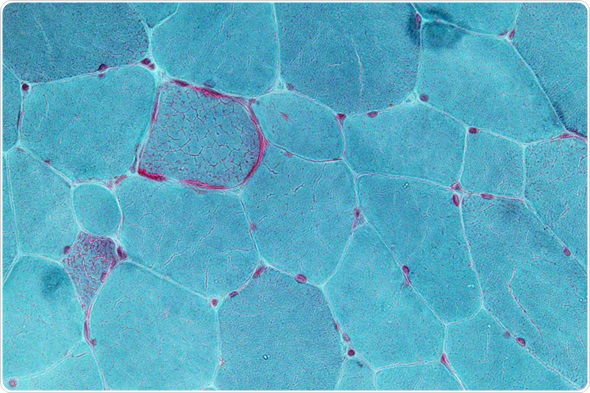The researchers of the University of Helsinki, Finland, and école Polytechnique Fédérale de Lausanne, Switzerland, have shown that vitamin B3 form nicotinamide riboside can slow down the progression of mitochondrial disease, suggesting its potential as a novel therapy approach to adult-onset mitochondrial muscle diseases.
Vitamins B have recently been turned out to be potent modifiers of energy metabolism, especially the function of mitochondria. Vitamin B3, (niacin) has been found to delay the signs of aging in animal models.

Micrograph showing ragged red fibres, a finding seen in mitochondrial diseases. Muscle
biopsy. Gomori trichrome stain.
An international collaboration between the University of Helsinki and école Polytechnique Fédérale de Lausanne reported today in the high-profile journal, Embo Molecular Medicine, that vitamin B3 form, nicotinamide riboside, can slow down the progression of mitochondrial disease, suggesting its potential as a novel therapy approach to adult-onset mitochondrial muscle diseases.
Mitochondria power up all cells in our bodies, by generating fuel, ATP, for all cellular functions. Dysfunction of these cellular engines can cause mitochondrial disorders, which are the most common cause of inherited metabolic diseases in adults and children. Mitochondrial myopathy is the most frequent form of adult mitochondrial disorder. The typical symptoms in the patients are muscle weakness, pain and cramps. Despite the progressive nature of these diseases, no curative treatment is available.
In their current publication, Dr Nahid Khan in Prof Anu Suomalainen Wartiovaara's group showed that feeding mice with food supplemented with B3 form, nicotinamide riboside, delayed their mitochondrial myopathy. The treatment increased mitochondrial mass and function, and cured the structural abnormalities. These results clearly showed the potential of this vitamin B form, a natural constituent of milk, to activate dysfunctional mitochondrial metabolism.
"These results are a breakthrough for understanding the mechanisms of human mitochondrial muscle diseases and for exploring the efficient treatment options for these progressive disorders of adults. They also highlight the potent role of niacin in guiding mitochondrial energy metabolism", Professor Anu Suomalainen Wartiovaara states.